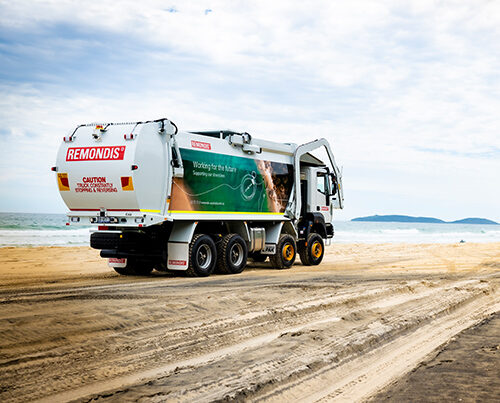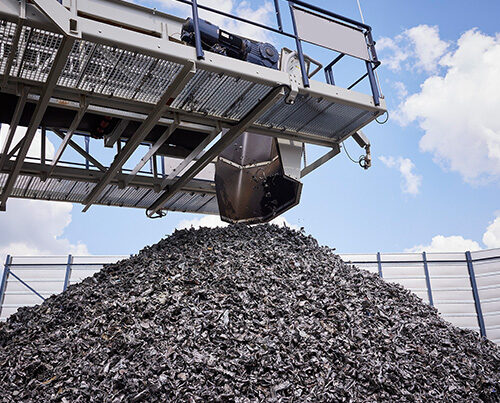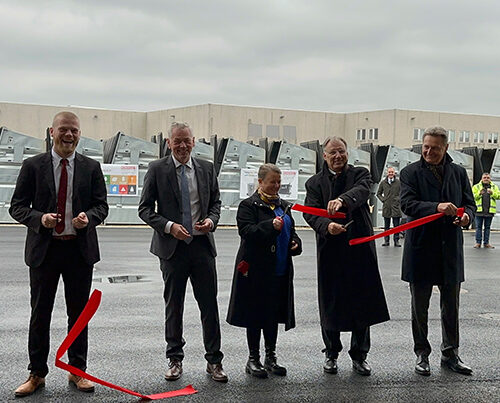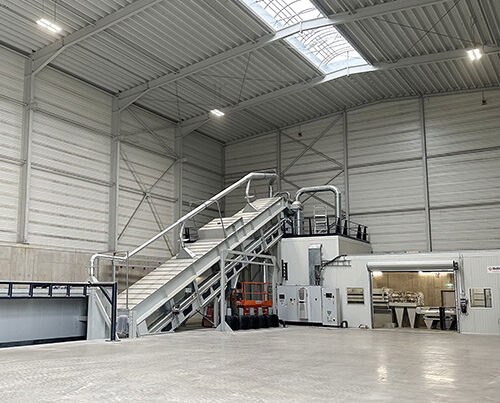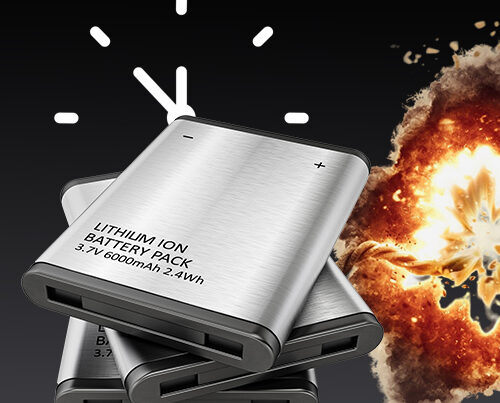Mobility is undergoing a radical change
Two inventions have radically changed mobility over the course of history: when the horse and cart were brought together and the combustion engine. The latter, which Kaiser Wilhelm II had first believed to be nothing more than a technical toy, had such a profound impact on society at the beginning of the 20th Century that it is practically impossible to imagine life without this technology. Today, mobility is once again undergoing a radical change. With the country in danger of not reaching its climate goals and a ban on diesel vehicles becoming a real threat, the recycling industry is on the look-out for clean, eco-efficient trucks. In their search for the best possible solution, REMONDIS has now joined forces with GVG Rhein-Erft, Zukunft ERDGAS and IVECO to start a pilot project that aims to significantly reduce emissions and noise pollution caused by refuse collection vehicles.
IVECO’s biogas-fuelled truck
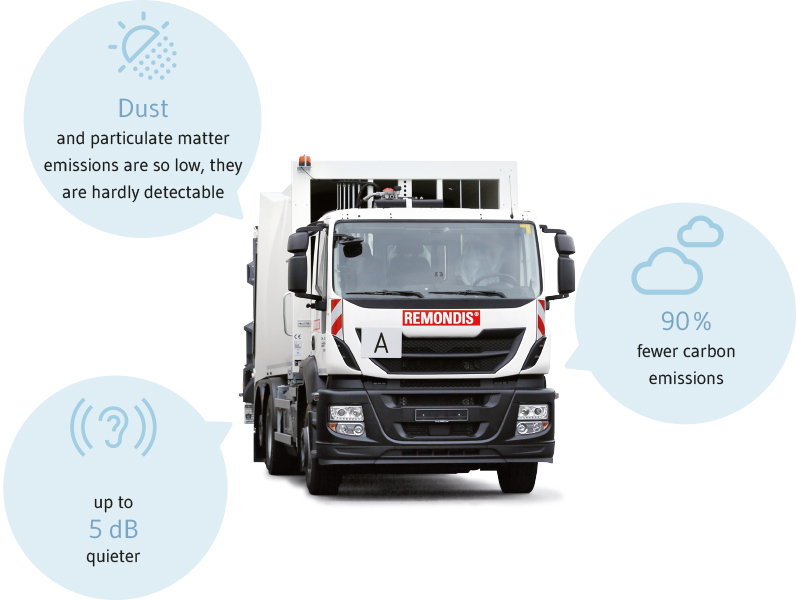
E-mobility has its disadvantages
A number of very different approaches have been looked at to develop “clean” trucks, just as there have been for cars. With the politicians pushing for e-mobility, the most obvious solution would appear to be battery-run electric lorries. There are a few problems here however. Less material can be loaded onto the truck because of the weight of the battery. Which means that around 30 percent more vehicles would be needed to transport the same amount of waste. What’s more, electric trucks are far more expensive to buy than refuse collection trucks run on diesel. They are also unable to travel so far and, of course, up to ten hours are needed to recharge their batteries. Not the most flexible solution then. Having said that, though, REMONDIS is continuing to keep a close eye on the way this technology is progressing. E-mobility may certainly become an interesting option if – eventually – the batteries become lighter and run for longer, if less time is needed to recharge the batteries and if there is not such a big difference in price between electric and diesel-fuelled trucks. This is, however, unlikely to happen in the near future.
REMONDIS is looking at biogas
REMONDIS and its partners have, therefore, begun their first pilot project to test climate-neutral waste collection trucks run on biogas. Compared to diesel-fuelled trucks, these eco-friendly vehicles could help improve air quality and reduce noise pollution in cities. The fuel biomethane (also known as biogas) has been produced by the recycling industry for a while now – a sign of its modern and innovative focus. Over the last few years, REMONDIS and a number of other companies have succeeded in using state-of-the-art digester facilities to transform household organic waste into carbon-neutral, climate-friendly biomethane. Previously fed into the gas network to produce electricity and heat, this biogenic substance can now also be used to fuel waste collection vehicles thanks to a pilot project set up by REMONDIS and its partners.
Carbon-neutral waste collections with practically no particulate matter or NOX emissions and much quieter to boot. The advantages of biogas-run vehicles are in the air.
“I believe in horses. Automobiles are a passing phenomenon.”
Kaiser Wilhelm II completely misjudged the impact cars would have on mobility
Well below emission limits
One of the partners involved in the project is IVECO which has provided this modern vehicle technology. The technical performance of IVECO’s biogas-fuelled vehicles is just as good as a waste collection truck run on diesel. What’s more, their ecological footprint is much better: 90% fewer carbon emissions and approx. 60% less nitric oxide – and they are up to five decibels quieter. The dust and particulate matter emissions are so low, they are hardly detectable at all. Which all means that biomethane is a potential short-term solution for those looking for a fuel that not only meets but also clearly falls below the Euro 6 nitric oxide and particulate matter emission limits. Over the long term, this fuel – which is based on a raw material that is both sustainable and readily available – could facilitate climate-neutral mobility.
Experts expect the volume of organic waste collected in Germany to increase greatly in the future with local authorities now being obliged by law to distribute organic waste bins to ensure this waste stream is collected separately. At present, 9 TWh of biomethane are being produced from biomass across Germany every year. Even though this waste stream must be collected separately, however, four million tonnes of organic waste are still being thrown into the residual waste bin. Were more to be made of this material, then up to 100 TWh of biomethane could be generated each year. Experts believe that this would be enough biomethane to fuel 50% of all commercial vehicles on Germany’s roads.
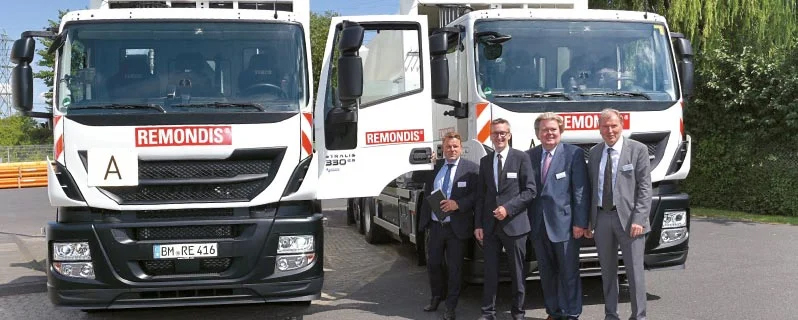
The project was officially presented during a press conference: (from left to right) Lars Nehrling, Head of Municipal Sales at REMONDIS, Werner Abromeit, Managing Director of GVG Rhein-Erft, Klaus Voussem, Spokesperson of the Transport Committee of the State Parliament of North Rhine-Westphalia and Member of the State Parliament, and Reinhard Hohenstein, Managing Director of REMONDIS GmbH Rheinland
Pilot project near Cologne
As is so often the case, a successful idea involves the meeting of minds. The person at REMONDIS behind this particular project was Jürgen Mauthe, managing director of the company’s Rhineland division. He was the first to see the potential of the biogas pilot project during a meeting with IVECO in September 2017. He then brought in Lars Nehrling, head of municipal sales, and Nino Heidenreich, project manager for energy plants at REMONDIS, to take a closer look at the idea. Collaborating closely with Dr. Ansgar Fendel, the managing director in charge of plant technology, the two quickly set up a network that included Josef Holtermann and Stefan Bülskemper, the fleet managers at REMONDIS and its sister company Rhenus, Volker Drexler, the operations manager responsible for the test region Erftstadt, and Wolfgang Klein, logistics manager in Cologne, to name just a few.
And the team can be proud of their work. The partners began testing these climate-neutral trucks in Pulheim and Erftstadt (near Cologne) on 01 August. To begin with, these tests will involve six IVECO vehicles. The drivers can fill up with this green fuel at a new autogas pump which REMONDIS and GVG have installed in Hürth with the help of Zukunft ERDGAS. The time needed to fill up the tanks will not be much longer than with any other vehicle as the trucks are equipped with fast fill technology. All in all, the drivers need around 8 minutes to fill the gas tanks. When used to collect waste, the vehicles can then cover approx. 200km. Eight gas tanks are able to hold 640 litres of gas, with the fuel weighing just 88kg. While diesel-fuelled trucks are able to cover longer distances (approx. 400km more), this eco-friendly alternative is more than able to complete a standard waste collection route in a medium-sized town without having to stop at a filling station. Paris, London and other large European cities have been using trucks run on natural gas for many years – demonstrating that this clean technology can be used in large built-up areas as well.
E-mobility? Biogas? Hydrogen? It’s not clear yet which technology will win the race and become the preferred choice in the future.
A role model for other regions
Other regions have already shown an interest in the project. Exploratory talks have, for example, begun in the north of Germany. The Polish government is also observing REMONDIS’ pilot project with growing interest having recently begun the process of drawing up a new law on e-mobility and alternative fuels for its country. Düsseldorf-based Awista, a public private partnership between the city council and REMONDIS, have already decided to purchase three biogas-fuelled refuse collection trucks. Further projects are expected to follow in Cologne, Bonn and Münster.
It is already possible to see how this technology could develop. Firstly, it has shown that it is possible to have carbon-neutral waste collection services across the whole of Germany. However, for this to happen, politicians need to show more support for the idea. Local and city councils must make it clear that they want to have clean forms of transport by including them in their tenders and rating them more positively. Last but not least, such trucks must be affordable so that they do not impact negatively on fees and charges. Being an expert for carbon-neutral waste logistics, REMONDIS is there to help with its dedicated staff and practical know-how.
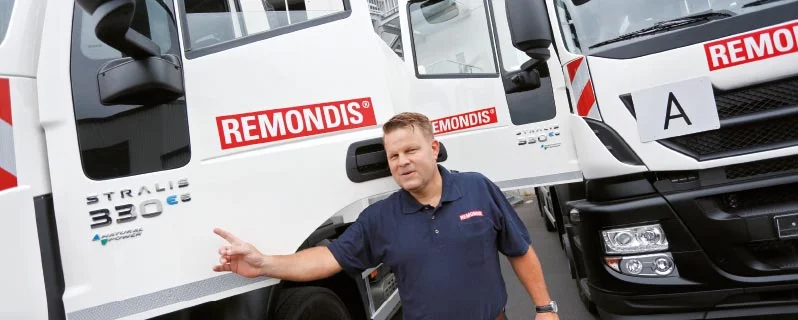
Lars Nehrling, Head of Municipal Sales at REMONDIS, is confident that the 640l tank in IVECO’s “Stralis 330 ES Natural Power” truck will be able to cover two shifts
Technical information
These new vehicles have a three-axle chassis with a steerable trailer axle to improve manoeuvrability. The 26-tonnes trucks have been fitted with a 330 PS engine. As the nature of the work means these trucks are constantly stopping and starting, they have all been fitted out with an Allison gearbox to reduce wear and tear. This also enables the drivers to focus completely on the traffic around them. Safety is also at the top of the list of priorities: at REMONDIS’ request, IVECO has installed a turning assist system. A screen is activated in the A pillar when the indicator is turned on, enabling the drivers to check their blind spot.
Image credits: © REMONDIS







